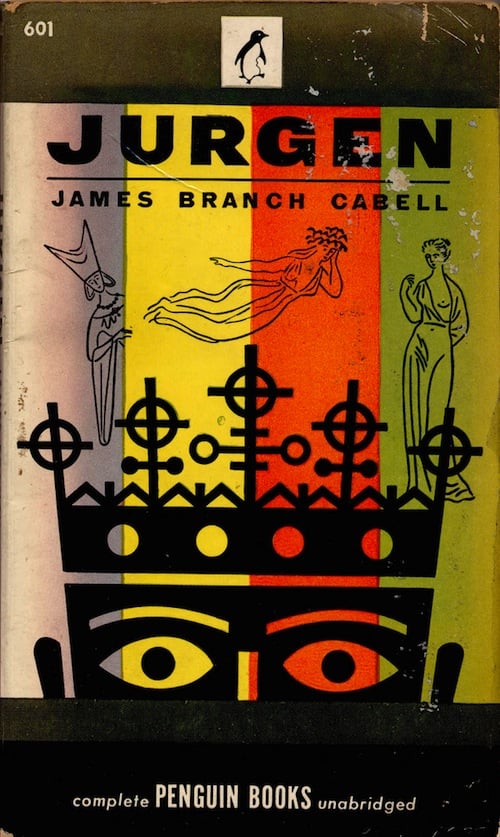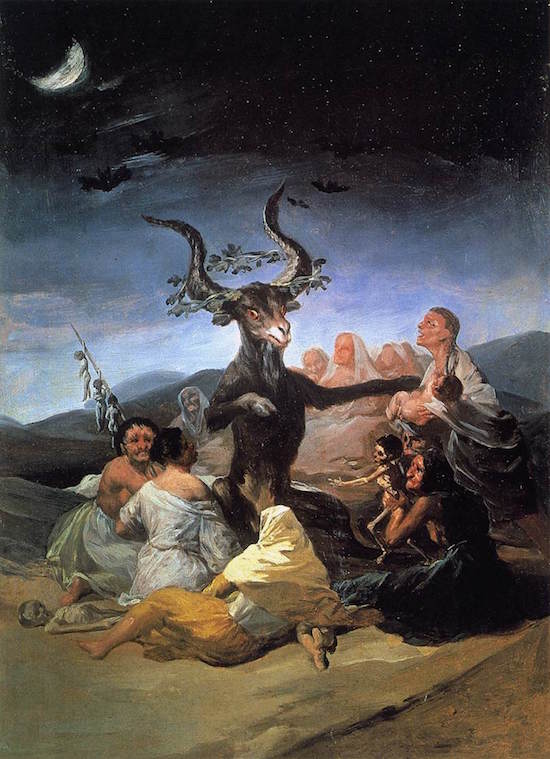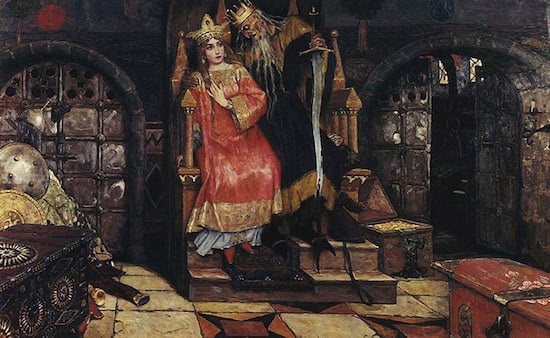Jurgen (36)
By:
November 21, 2015

James Branch Cabell’s 1919 ironic fantasy novel Jurgen, A Comedy of Justice, the protagonist of which seduces women everywhere he travels — including into Arthurian legend and Hell itself — is (according to Aleister Crowley) one of the “epoch-making masterpieces of philosophy.” Cabell’s sardonic inversion of romantic fantasy was postmodernist avant la lettre. HiLoBooks is pleased to serialize Jurgen here at HILOBROW. Enjoy!
Next the tale tells how three inferior devils made a loud music with bagpipes as Jurgen went into the Black House of Barathum, to talk with Grandfather Satan.
Satan was like a man of sixty, or it might be sixty-two, in all things save that he was covered with gray fur, and had horns like those of a stag. He wore a breech-clout of very dark gray, and he sat in a chair of black marble, on a daïs: his bushy tail, which was like that of a squirrel, waved restlessly over his head as he looked at Jurgen, without speaking, and without turning his mind from an ancient thought. And his eyes were like light shining upon little pools of ink, for they had no whites to them.
“What is the meaning of this insane country?” says Jurgen, plunging at the heart of things. “There is no sense in it, and no fairness at all.”
“Ah,” replied Satan, in his curious hoarse voice, “you may well say that: and it is what I was telling my wife only last night.”
“You have a wife, then!” says Jurgen, who was always interested in such matters. “Why, but to be sure! Either as a Christian or as a married man, I should have comprehended this was Satan’s due. And how do you get on with her?”

“Pretty well,” says Grandfather Satan: “but she does not understand me.”
“Et tu, Brute!” says Jurgen.
“And what does that mean?”
“It is an expression connotating astonishment over an event without parallel. But everything in Hell seems rather strange, and the place is not at all as it was rumored to be by the priests and the bishops and the cardinals that used to be exhorting me in my fine palace at Breschau.”
“And where, did you say, is this palace?”
“In Noumaria, where I am the Emperor Jurgen. And I need not insult you by explaining Breschau is my capital city, and is noted for its manufacture of linen and woolen cloth and gloves and cameos and brandy, though the majority of my subjects are engaged in cattle-breeding and agricultural pursuits.”
“Of course not: for I have studied geography. And, Jurgen, it is often I have heard of you, though never of your being an emperor.”
“Did I not say this place was not in touch with new ideas?”
“Ah, but you must remember that thoughtful persons keep out of Hell. Besides, the war with Heaven prevents us from thinking of other matters. In any event, you Emperor Jurgen, by what authority do you question Satan, in Satan’s home?”
“I have heard that word which the ass spoke with the cat,” replied Jurgen; for he recollected upon a sudden what Merlin had shown him.
Grandfather Satan nodded comprehendingly. “All honor be to Set and Bast! and may their power increase. This, Emperor, is how my kingdom came about.”
Then Satan, sitting erect and bleak in his tall marble chair, explained how he, and all the domain and all the infernal hierarchies he ruled, had been created extempore by Koshchei, to humor the pride of Jurgen’s forefathers. “For they were exceedingly proud of their sins. And Koshchei happened to notice Earth once upon a time, with your forefathers walking about it exultant in the enormity of their sins and in the terrible punishments they expected in requital. Now Koshchei will do almost anything to humor pride, because to be proud is one of the two things that are impossible to Koshchei. So he was pleased, oh, very much pleased: and after he had had his laugh out, he created Hell extempore, and made it just such a place as your forefathers imagined it ought to be, in order to humor the pride of your forefathers.”
“And why is pride impossible to Koshchei?”

“Because he made things as they are; and day and night he contemplates things as they are, having nothing else to look at. How, then, can Koshchei be proud?”
“I see. It is as if I were imprisoned in a cell wherein there was nothing, absolutely nothing, except my verses. I shudder to think of it! But what is this other thing which is impossible to Koshchei?”
“I do not know. It is something that does not enter into Hell.”
“Well, I wish I too had never entered here, and now you must assist me to get out of this murky place.”
“And why must I assist you?”
“Because,” said Jurgen, and he drew out the cantrap of the Master Philologist, “because at the death of Adrian the Fifth, Pedro Juliani, who should be named John the Twentieth, was through an error in the reckoning elevated to the papal chair as John the Twenty-first. Do you not find my reason sufficient?”
“No,” said Grandfather Satan, after thinking it over, “I cannot say that I do. But, then, popes go to Heaven. It is considered to look better, all around, and particularly by my countrymen, inasmuch as many popes have been suspected of pro-Celestialism. So we admit none of them into Hell, in order to be on the safe side, now that we are at war. In consequence, I am no judge of popes and their affairs, nor do I pretend to be.”
And Jurgen perceived that again he had employed his cantrap incorrectly or else that it was impotent to rescue people from Satan. “But who would have thought,” he reflected, “that Grandfather Satan was such a simple old creature!”
“How long, then, must I remain here?” asks Jurgen, after a dejected pause.
“I do not know,” replies Satan. “It must depend entirely upon what your father thinks about it —”
“But what has he to do with it?”
“— Since I and all else that is here are your father’s absurd notions, as you have so frequently proved by logic. And it is hardly possible that such a clever fellow as you can be mistaken.”
“Why, of course, that is not possible,” says Jurgen. “Well, the matter is rather complicated. But I am willing to taste any drink once: and I shall manage to get justice somehow, even in this unreasonable place where my father’s absurd notions are the truth.”
So Jurgen left the Black House of Barathum: and Jurgen also left Grandfather Satan, erect and bleak in his tall marble chair, and with his eyes gleaming in the dim light, as he sat there restively swishing his soft bushy tail, and not ever turning his mind from an ancient thought.
Footnotes from Notes on Jurgen (1928), by James P. Cover — with additional comments from the creators of this website; rewritten, in some instances, by HiLoBooks.
* Breschau — The capital city of Noumaria appears again in Gallantry.
* Set — Set was a deity once worshiped by the Egyptians. He was represented as an ass-headed man holding in his hand the crux ansata, and was regarded as the personification of an evil principle.
* Bast — Bast (AKA Bastet, Ailuros) is an important ancient Egyptian Goddess and protector of cats, women and children. She is Goddess of sunrise. Her goddess duty changed over the years, but she is also known as a goddess of love, fertility, birth, music and dance. She has been dated to at least the Second Dynasty (c. 2890-2686 BC). She is most commonly depicted with the body of young woman and the head of a domestic cat, sometimes holding a sistrum (an ancient Egyptian rattle, a percussion instrument consisting of a thin metal frame with rods or loops attached that jingle when shaken). Her cult center was in Bubastis.
RADIUM AGE SCIENCE FICTION: “Radium Age” is HILOBROW’s name for the 1904–33 era, which saw the discovery of radioactivity, the revelation that matter itself is constantly in movement — a fitting metaphor for the first decades of the 20th century, during which old scientific, religious, political, and social certainties were shattered. This era also saw the publication of genre-shattering writing by Edgar Rice Burroughs, Sax Rohmer, E.E. “Doc” Smith, Jack London, Arthur Conan Doyle, Aldous Huxley, Olaf Stapledon, Karel Čapek, H.P. Lovecraft, Charlotte Perkins Gilman, Yevgeny Zamyatin, Philip Gordon Wylie, and other pioneers of post-Verne/Wells, pre-Golden Age “science fiction.” More info here.
READ GORGEOUS PAPERBACKS: HiLoBooks has reissued the following 10 obscure but amazing Radium Age science fiction novels in beautiful print editions: Jack London’s The Scarlet Plague, Rudyard Kipling’s With the Night Mail (and “As Easy as A.B.C.”), Arthur Conan Doyle’s The Poison Belt, H. Rider Haggard’s When the World Shook, Edward Shanks’ The People of the Ruins, William Hope Hodgson’s The Night Land, J.D. Beresford’s Goslings, E.V. Odle’s The Clockwork Man, Cicely Hamilton’s Theodore Savage, and Muriel Jaeger’s The Man with Six Senses. For more information, visit the HiLoBooks homepage.
SERIALIZED BY HILOBOOKS: Jack London’s The Scarlet Plague | Rudyard Kipling’s With the Night Mail (and “As Easy as A.B.C.”) | Arthur Conan Doyle’s The Poison Belt | H. Rider Haggard’s When the World Shook | Edward Shanks’ The People of the Ruins | William Hope Hodgson’s The Night Land | J.D. Beresford’s Goslings | E.V. Odle’s The Clockwork Man | Cicely Hamilton’s Theodore Savage | Muriel Jaeger’s The Man With Six Senses | Jack London’s “The Red One” | Philip Francis Nowlan’s Armageddon 2419 A.D. | Homer Eon Flint’s The Devolutionist | W.E.B. DuBois’s “The Comet” | Edgar Rice Burroughs’s The Moon Men | Charlotte Perkins Gilman’s Herland | Sax Rohmer’s “The Zayat Kiss” | Eimar O’Duffy’s King Goshawk and the Birds | Frances Hodgson Burnett’s The Lost Prince | Morley Roberts’s The Fugitives | Helen MacInnes’s The Unconquerable | Geoffrey Household’s Watcher in the Shadows | William Haggard’s The High Wire | Hammond Innes’s Air Bridge | James Branch Cabell’s Jurgen | John Buchan’s “No Man’s Land” | John Russell’s “The Fourth Man” | E.M. Forster’s “The Machine Stops” | John Buchan’s Huntingtower | Arthur Conan Doyle’s When the World Screamed | Victor Bridges’ A Rogue By Compulsion | Jack London’s The Iron Heel | H. De Vere Stacpoole’s The Man Who Lost Himself | P.G. Wodehouse’s Leave It to Psmith | Richard Connell’s “The Most Dangerous Game” | Houdini and Lovecraft’s “Imprisoned with the Pharaohs” | Arthur Conan Doyle’s “The Sussex Vampire.”
ORIGINAL FICTION: HILOBROW has serialized three novels: James Parker’s The Ballad of Cocky The Fox (“a proof-of-concept that serialization can work on the Internet” — The Atlantic); Karinne Keithley Syers’s Linda Linda Linda (which includes original music); and Robert Waldron’s roman à clef The School on the Fens. We also publish original stories and comics. These include: Matthew Battles’s stories “Gita Nova“, “Makes the Man,” “Imago,” “Camera Lucida,” “A Simple Message”, “Children of the Volcano”, “The Gnomon”, “Billable Memories”, “For Provisional Description of Superficial Features”, “The Dogs in the Trees”, “The Sovereignties of Invention”, and “Survivor: The Island of Dr. Moreau”; several of these later appeared in the collection The Sovereignties of Invention | Peggy Nelson’s “Mood Indigo“, “Top Kill Fail“, and “Mercerism” | Annalee Newitz’s “The Great Oxygen Race” | Flourish Klink’s Star Trek fanfic “Conference Comms” | Charlie Mitchell’s “A Fantasy Land” | Charlie Mitchell’s “Sentinels” | Joshua Glenn’s “The Lawless One”, and the mashup story “Zarathustra vs. Swamp Thing” | Adam McGovern and Paolo Leandri’s Idoru Jones comics | John Holbo’s “Sugarplum Squeampunk” | “Another Corporate Death” (1) and “Another Corporate Death” (2) by Mike Fleisch | Kathryn Kuitenbrouwer and Frank Fiorentino’s graphic novel “The Song of Otto” (excerpt) | John Holbo’s graphic novel On Beyond Zarathustra (excerpt) | “Manoj” and “Josh” by Vijay Balakrishnan | “Verge” by Chris Rossi, and his audio novel Low Priority Hero | EPIC WINS: THE ILIAD (1.408-415) by Flourish Klink | EPIC WINS: THE KALEVALA (3.1-278) by James Parker | EPIC WINS: THE ARGONAUTICA (2.815-834) by Joshua Glenn | EPIC WINS: THE MYTH OF THE ELK by Matthew Battles | TROUBLED SUPERHUMAN CONTEST: Charles Pappas, “The Law” | CATASTROPHE CONTEST: Timothy Raymond, “Hem and the Flood” | TELEPATHY CONTEST: Rachel Ellis Adams, “Fatima, Can You Hear Me?” | OIL SPILL CONTEST: A.E. Smith, “Sound Thinking | LITTLE NEMO CAPTION CONTEST: Joe Lyons, “Necronomicon” | SPOOKY-KOOKY CONTEST: Tucker Cummings, “Well Marbled” | INVENT-A-HERO CONTEST: TG Gibbon, “The Firefly” | FANFICTION CONTEST: Lyette Mercier’s “Sex and the Single Superhero”
